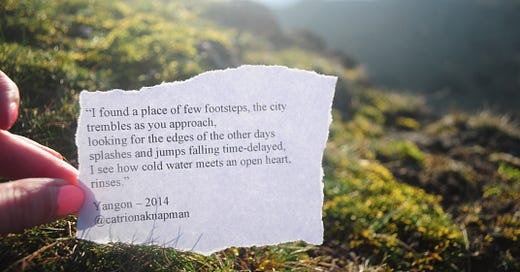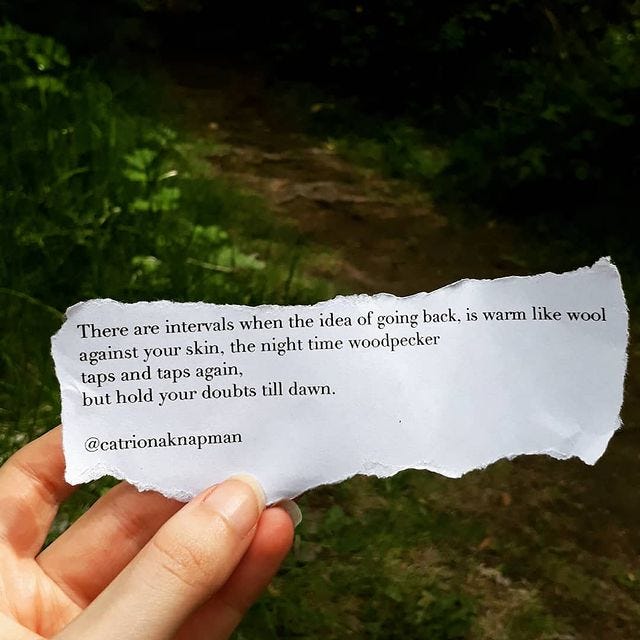Hard-Won Lessons From Submitting to Literary Journals
What I would tell my younger self to search for instead of an editor's recognition
Hello friends,
Thank you for being here.
I was going through my writing archives recently, rereading old poems.
I used to edit my words until I was confident they were perfect - even if they had rushed out of my pen in a magical flow state. Even if they expressed an important emotion or life event. I was determined to make them objectively ‘good.’
I thought ‘good’ meant being recognised by literary journals. And writers I knew and blogs I read told me that to be recognised as a writer, I needed to have my words accepted into these literary palaces.
Over lockdown, I published excerpts from these poems on Instagram - sharing a few links to illustrate this piece.
For years I had a system. It was a system I was certain would help me become a published author: one with a poetry collection and sufficient recognition from the industry to get book deals. I evidenced my commitment and my craft by shaping perfect writing and then submitting it for approval.
I had a spreadsheet and a method. I studied all the magazines (the many many magazines) and then I read through my little creations and thought very carefully about each submission bundle - so that what I sent catered to the specific needs of each of these magazines.
After much deliberation, I emailed these small bundles, my hope wrapped up in pages formatted exactly, as requested.
I also carefully kept track of what I had submitted to each journal in the spreadsheet so that I did not commit the shameful offence of sending a magazine the same poem twice.
I did not share my poems in other places. Because of the rules.
The rules stated that once a piece was published in one journal, the chance of getting it accepted in another journal was very very low. So I guarded my poems from the world to assure them the best chance of being published.
I was confident that once published, these words poured from my heart would receive a rubber stamp of approval - which would mean they were worthy and all the pain, ultimately, worth it.
I published some poems in this way, in those ‘good’ literary journals. The ones that were rejected I decided needed work, or worse, needed explaining.
I did not know much about gatekeepers then. No one used that term. I was taught that the people who curated these journals were objective. They knew good writing when they saw it. And any decisions they made were therefore ‘right’.
No one told me that writing from young woman’s perspective, in a mix of languages about a decade during which I moved from Scotland to France to Luxembourg to Nicaragua to Italy to London to Egypt then Myanmar, immersed in tiny details of local politics and daily life and the pain of being in an abusive relationship, probably wasn’t something that most small print literary editors were going to relate to.
No one suggested that in obeying these rules and keeping these poems hidden, I might miss the opportunity of sharing my heart, of finding allies and of building community around what I was aching to say and share with others
.When I look back, I don’t think these small nods of approval served much. I don’t think any current gatekeepers (i.e. agents reading my novel) care either. I am not even sure they meant much to me apart from a fleeting pride and short-lived sense of recognition.
It seems now, such a patriarchal approach to art. With inbuilt systems to keep an artist lonely, unseen and seeking approval from people very unlikely to connect to their experience.
Those faceless people at the end of emails, deciding which words were worthy of being included in their pages, with little conversation and exchange.
They took them. They were printed. The world turned. Nothing changed.
When I read back through all my poems now - rejected or accepted - I find them a beautiful storybook of my life. Full of intimate details of my inner world infused with the otherwise forgotten moments from the outer worlds that shaped me.
And I offer them the validation that the world did not give me.
I learned not to give strangers the power to decide what I value. Instead, to use my creativity to learn what I like. To embrace the magic of words to capture experiences I had no other outlets to express or share.
To return to those moments, which, if I had not noticed, not written them down, would now, already be gone.
Travel With Me:
What is your experience of submitting to literary journals?
What was your process to find community and confidence in your art?
I had the pleasure to walk with
author of this week.You can read our shared adventure here:
You can read more of Bonnie’s nature diary and record of wild walks and wild swims here: Wild Quiet Folk
See you next week,
Catriona










I am so with you on this. I’ve been more of a poem hoarder probably because I didn’t really want to give my poems away to people who wouldn’t care anyway. But now I am learning to share without worry about how they will be received. It’s about Love and it always has been and learning to value who I am congratulations to you and I really wish you all happiness and contentment and I will eagerly follow your posts. I’m not too coherent right now, but dammit who cares? I just wanted to let you know that you reached me.
So interesting to come across this piece today, Catriona, just as I have been looking at some of this year's submissions (all rejected bar one) and wondering what to do with them... It was only a few weeks ago that I finally got clear on what I want my writing to do, and it is to inspire ordinary people who, by and large, don't read literary journals (I don't read them either, and I'm a writer!). What matters is that we share our stories, and I'm here (on Substack) for that.